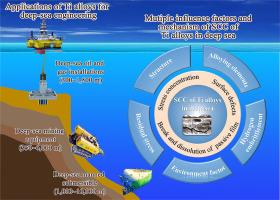当前位置:
X-MOL 学术
›
J. Mater. Sci. Technol.
›
论文详情
Our official English website, www.x-mol.net, welcomes your
feedback! (Note: you will need to create a separate account there.)
Perspective review on factors that influence the stress corrosion of Ti alloys for deep-sea applications
Journal of Materials Science & Technology ( IF 11.2 ) Pub Date : 2024-11-13 , DOI: 10.1016/j.jmst.2024.10.022 Zhen Li, Lin Fan, Li Ma, Tigang Duan, Haibing Zhang, Jian Hou, Mingxian Sun
Journal of Materials Science & Technology ( IF 11.2 ) Pub Date : 2024-11-13 , DOI: 10.1016/j.jmst.2024.10.022 Zhen Li, Lin Fan, Li Ma, Tigang Duan, Haibing Zhang, Jian Hou, Mingxian Sun

|
This paper reviews the current state of knowledge and advances on the stress-corrosion cracking (SCC) of Ti alloys subject to harsh corrosive environments in the deep sea, and presents the knowledge gaps and future directions. A comprehensive review of classifications and applications of Ti alloys for deep-sea engineering indicates that the near-α and α + β Ti alloys with high strength and great weldability are the primary selection for deep-sea equipment. The role of residual stress, microstructure types, alloying elements and corrosive environmental factors on SCC performance of Ti alloys are also summarised. It is revealed that the Ti alloys with Widmanstatten structure show the lowest SCC susceptibility, and alloying of Nb, Mo and Al elements plays a positive role in the boost corrosion resistance of passive film. Synergistic effects of environmental deep-sea factors include high hydrostatic pressure, low dissolved oxygen content, low temperature and decreasing pH levels intensify the SCC of Ti alloys by inducing local dissolution of the passive film and facilitating hydrogen-induced cracking at crack tip. The study also highlights future research requirements in SCC of Ti alloys in deep sea: including the set-up of unified and suitable methods of in-situ and simulated experiments, modeling and predicting of SCC behaviour in real situations, and exploring practical protective strategies specifically. These findings provide a reference for further SCC mechanisms research and promote the microstructure optimisation and performance improvement of the advanced Ti alloy-based material systems for deep-sea engineering.
中文翻译:

影响深海应用 Ti 合金应力腐蚀的因素的透视回顾
本文综述了深海受恶劣腐蚀环境下 Ti 合金应力腐蚀开裂 (SCC) 的知识现状和进展,并提出了知识差距和未来发展方向。对深海工程中 Ti 合金的分类和应用的综合回顾表明,强度高、焊接性好的近α和 α + β Ti 合金是深海装备的首选。还总结了残余应力、微观结构类型、合金元素和腐蚀性环境因素对 Ti 合金 SCC 性能的影响。结果表明,具有 Widmanstatten 结构的 Ti 合金表现出最低的 SCC 敏感性,Nb、Mo 和 Al 元素的合金化对增强钝化膜的耐腐蚀性起着积极作用。环境深海因素的协同效应包括高静水压力、低溶解氧含量、低温和 pH 值降低,通过诱导钝化膜的局部溶解并促进裂纹尖端的氢诱导开裂,加剧了 Ti 合金的 SCC。该研究还强调了深海钛合金 SCC 的未来研究要求:包括建立统一和合适的原位和模拟实验方法,在真实情况下对 SCC 行为进行建模和预测,以及具体探索实用的保护策略。这些发现为进一步的 SCC 机制研究提供了参考,并促进了用于深海工程的先进 Ti 合金基材料体系的微观结构优化和改进。
更新日期:2024-11-13
中文翻译:

影响深海应用 Ti 合金应力腐蚀的因素的透视回顾
本文综述了深海受恶劣腐蚀环境下 Ti 合金应力腐蚀开裂 (SCC) 的知识现状和进展,并提出了知识差距和未来发展方向。对深海工程中 Ti 合金的分类和应用的综合回顾表明,强度高、焊接性好的近α和 α + β Ti 合金是深海装备的首选。还总结了残余应力、微观结构类型、合金元素和腐蚀性环境因素对 Ti 合金 SCC 性能的影响。结果表明,具有 Widmanstatten 结构的 Ti 合金表现出最低的 SCC 敏感性,Nb、Mo 和 Al 元素的合金化对增强钝化膜的耐腐蚀性起着积极作用。环境深海因素的协同效应包括高静水压力、低溶解氧含量、低温和 pH 值降低,通过诱导钝化膜的局部溶解并促进裂纹尖端的氢诱导开裂,加剧了 Ti 合金的 SCC。该研究还强调了深海钛合金 SCC 的未来研究要求:包括建立统一和合适的原位和模拟实验方法,在真实情况下对 SCC 行为进行建模和预测,以及具体探索实用的保护策略。这些发现为进一步的 SCC 机制研究提供了参考,并促进了用于深海工程的先进 Ti 合金基材料体系的微观结构优化和改进。

































 京公网安备 11010802027423号
京公网安备 11010802027423号